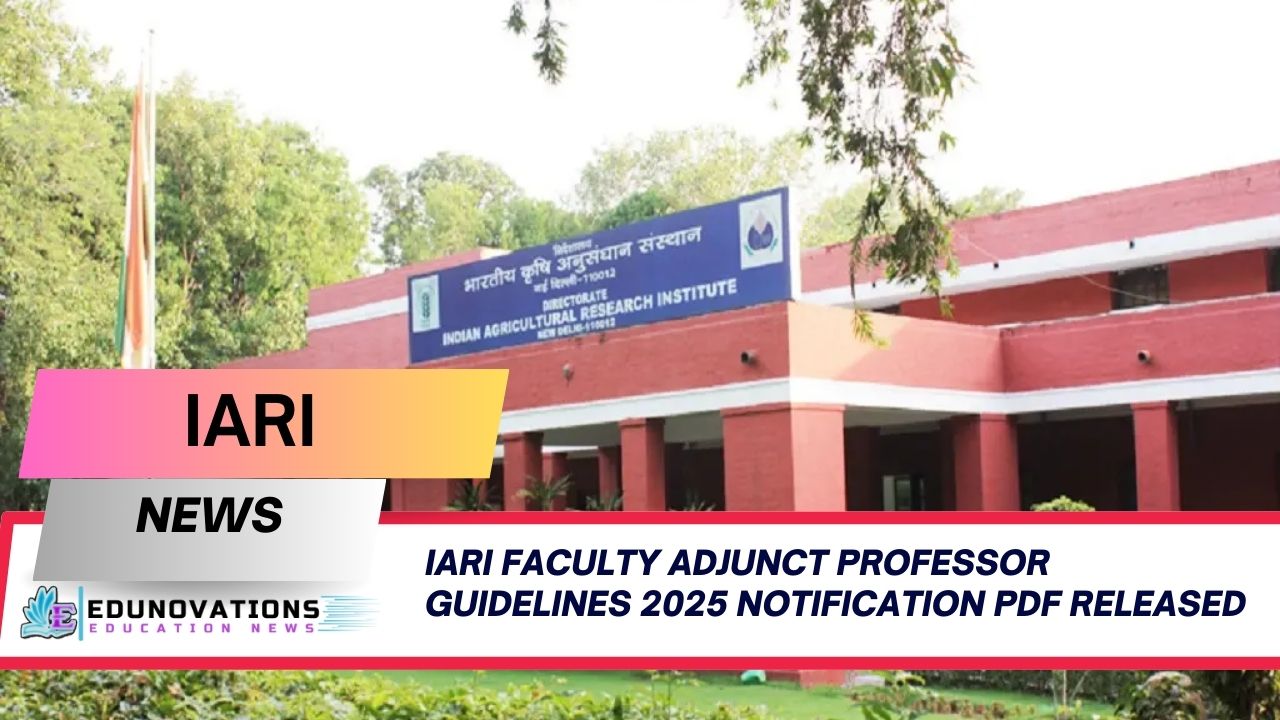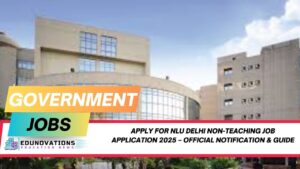Read the latest IARI faculty adjunct professor guidelines 2025 notification pdf. Learn about ICAR rules, approval process, and adjunct faculty engagement updates.
Introduction
The iari faculty adjunct professor guidelines 2025 notification pdf has been officially released by the Indian Agricultural Research Institute (IARI), New Delhi. This notification provides a comprehensive framework for the engagement of IARI faculty members as Adjunct Professors or Adjunct Faculty in Indian and overseas universities. Approved by the Academic Council of IARI, the guidelines outline the conditions, procedures, and restrictions under which faculty members may take up adjunct positions while continuing their commitments at the parent institute.
The move underscores the growing importance of academic collaboration between premier agricultural research institutions and universities worldwide. With agriculture education and research increasingly becoming interdisciplinary and global, the policy provides faculty members an opportunity to extend their expertise to wider academic communities.
Key Highlights of the Notification
- Approval Requirement
- Faculty members must obtain prior approval from the Dean and Director of IARI before applying to any host institution.
- Applications need to be routed through the respective Board of Studies.
- Scope of Work
- Engagement is limited to part-time teaching assignments.
- Faculty members are not permitted to conduct research or take part in administrative duties at host universities.
- Visit Limitations
- A maximum of four visits per academic year are allowed.
- Each visit may not exceed five working days.
- Leave and Financial Considerations
- Faculty must avail earned leave to participate in adjunct duties.
- No financial liability will be borne by ICAR or IARI.
- Conflict of Interest
- Faculty must ensure no conflict of interest arises between the parent institute and the host university.
- Only one adjunct engagement is allowed at a time.
Broader Context and Importance
The release of the notification aligns with global academic practices. In institutions such as the University of California and Wageningen University, adjunct faculty engagements are considered an effective way to strengthen knowledge networks and foster exchange. For IARI, this policy is a strategic step in ensuring its faculty gain exposure to diverse teaching environments while safeguarding institutional interests.
According to Dr. Trilochan Mohapatra, former Director General of ICAR, “Academic mobility is essential for India’s agricultural research system to remain globally relevant. Guidelines like these encourage faculty members to contribute to international teaching ecosystems without compromising their primary commitments.”
Toppers Use Mind Maps to score more than 95%
NCERT Class 11th Commerce Mind Maps
Add to cartOriginal price was: ₹999.00.₹199.00Current price is: ₹199.00.NCERT Class 12th Chemistry Mind Maps
Add to cartOriginal price was: ₹199.00.₹75.00Current price is: ₹75.00.NCERT Class 12th Commerce Mind Maps
Add to cartOriginal price was: ₹999.00.₹199.00Current price is: ₹199.00.NCERT Class 12th Science Mind Maps
Add to cartOriginal price was: ₹999.00.₹199.00Current price is: ₹199.00.NCERT Mind Maps For Class 10th
Add to cartOriginal price was: ₹999.00.₹199.00Current price is: ₹199.00.
Purchase Today
Academic Collaboration: Benefits and Opportunities
Engagement as adjunct faculty opens up several opportunities for IARI staff:
- Knowledge Transfer: Sharing expertise with universities broadens learning outcomes for students.
- Networking: Strengthens academic ties between agricultural research institutions and global universities.
- Capacity Building: Enhances faculty teaching experiences by engaging with diverse curricula.
- Global Exposure: Promotes international recognition of IARI’s research excellence.
For students in host universities, such collaborations ensure access to specialized knowledge in agricultural sciences, including crop improvement, soil management, biotechnology, and sustainable farming practices.
Challenges and Safeguards
While the policy enables cross-institutional collaboration, it also establishes safeguards:
- Adjunct roles are not a matter of right, and approval will be case-specific.
- Workload at IARI must remain unaffected, with written undertakings required from applicants.
- The policy discourages potential conflicts, such as overlaps in research interests or administrative clashes between institutions.
Such safeguards maintain the credibility and discipline of IARI’s academic framework while encouraging meaningful engagement.
Comparative Perspective
Policies for adjunct faculty engagement are not unique to IARI. Leading institutes like the Indian Institute of Science (IISc) and IITs have similar guidelines. However, IARI’s model is distinct in emphasizing agricultural education and research. By limiting adjunct activities to part-time teaching, the institute ensures that core research and extension responsibilities remain intact.
Linking Policy with Agricultural Education in India
Agricultural higher education in India is at a transformative stage. Institutions are actively seeking global collaborations to meet the challenges of climate change, food security, and sustainable agriculture. This notification places IARI faculty in a position to contribute to international debates while mentoring students beyond Indian borders.
For students and aspirants, exploring academic resources is crucial. Accessing NCERT courses, notes, and current affairs helps build foundational knowledge that complements updates like these. Moreover, free NCERT PDFs and mind maps provide structured learning material for competitive examinations related to agricultural and allied sciences.
Expert Insight
Dr. Ramesh Chand, Member of NITI Aayog and an expert in agricultural economics, has often highlighted that collaboration between institutions enhances both the quality and relevance of agricultural research. He notes, “Policies like adjunct faculty recognition are a step towards integrating Indian agricultural education with global practices, thereby preparing the next generation of scientists to address universal challenges.”
Conclusion
The iari faculty adjunct professor guidelines 2025 notification pdf reflects IARI’s commitment to balancing faculty autonomy with institutional discipline. By promoting structured adjunct faculty engagement, the institute is strengthening its role as a leader in agricultural education. While opportunities for knowledge-sharing expand, the notification ensures that the parent institute’s interests remain central.
This development is expected to foster meaningful academic collaborations, both nationally and internationally, while maintaining the rigorous standards that IARI has upheld for over a century.
FAQs
Q1. What is the iari faculty adjunct professor guidelines 2025 notification pdf about?
It outlines rules for IARI faculty members to serve as adjunct professors in Indian and foreign universities.
Q2. Can IARI faculty take up research duties in host universities under these guidelines?
No, they are limited to part-time teaching and cannot engage in research or administration.
Q3. How many visits can IARI faculty make to a host university in a year?
They can make up to four visits annually, with each visit limited to five working days.
Q4. Are there financial obligations on ICAR or IARI for faculty adjunct roles?
No financial liability is placed on ICAR or IARI for such engagements.
Q5. What approvals are required before applying for adjunct faculty positions?
Faculty must seek prior permission from the Dean and Director of IARI via their Board of Studies.
Q6. Can faculty members engage as adjunct professors in multiple universities at once?
No, they can only serve in one host institution at a time.
Q7. Is adjunct faculty engagement considered a right for IARI staff?
No, each case is considered on merit and prevailing institutional conditions.
Q8. Why is earned leave required for adjunct duties?
Because adjunct engagements involve personal financial arrangements, faculty must avail earned leave.
Q9. How does this notification benefit host universities?
Host universities gain access to IARI’s expertise in agricultural sciences and teaching excellence.
Q10. How does this policy align with global practices?
It is similar to policies in leading institutions worldwide, ensuring knowledge exchange while preserving institutional priorities.














